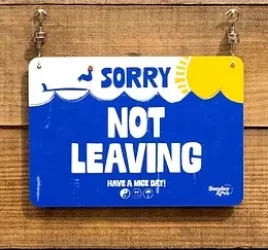Three Places to Drop Anchor in Cultural Storms
By Brad Hillman, Pastor of the Al Ain Evangelical Church in UAE
In recent years, reality TV show Deadliest Catch has popularized one of the most dangerous professions in the world—crab fishing in Alaska. If not for the tempestuous and violent Bering Sea, the profession would make for quite a dull reality show, but in every episode, the fisherman are pummeled by the shifting currents, the towering waves, and the violent hurricane winds. On good days, the fishermen are able to adapt and endure the elements to successfully harvest the crabs almost worth their weight in gold. On bad days, they catch nothing, endure serious injuries, and sometimes even drown.
Eight years ago, I left the predictability of my home church culture and entered the tumultuous seas of shepherding an international church. The homeland shore was still in sight when the wind began to blow, and I soon found myself in a storm of conflicting cultures, customs and theology.
Like so many international churches, members felt the freedom to share their own individual perspectives on everything—the roles of women, the authority of the pastor, finances and that most sacred event—determining where the announcements should fall in the order of worship.
Adding to the struggles of the international church is the occasional unwillingness to understand the diversity of others. The oft-repeated statement I’ve heard too many times is “How could they possibly think that!” When someone says something like this, I know this person is convinced that his or her view is a lighthouse amidst a storm of stupidity. To be sure, there may be merits to their argument, but the reality is that they are blowing as hard as the rest of the congregants. The reason I know this to be true is that I have thought and uttered those exact words. Ugh!
Storms are always a part of the harvest. In fact, conflict can be an indication that your course is the right one. So what can you hold fast to when the wind begins to blow? After eight years, I don’t have all the answers, but I do have three anchor points or three questions that keep me from drifting off course.

Am I being pulled by a current of fear? Perhaps the current of fear doesn’t flow in your church, but it does in most. The multi-cultural congregation often stresses the need for folks to get along which creates a strong undercurrent of concern that conflict is bad and something to be avoided. The truth is though that conflict should be a poignant reminder that we are broken individuals that desperately need a savior. I don’t look forward to conflict, but there is no substitute for how conflict can bring out the best in people. It can also bring out the worst, but most times, the conflict needs to be out on the table in order to move forward. It’s no surprise that throughout scripture God uses boats and bad weather to show that He is in sovereign control. Fear has a tremendous undertow in most of us, but “He has not given us a spirit of fear, but of power and love and self control.” II Timothy 1:7
Is being right, worth more than fellowship? Even after recognizing other cultural perspectives and trying to understand other opinions, sometimes you just know that you’re right. But fellowship is about more than being right, and most of the time fellowship is worth more than proving someone wrong. It takes a deliberate wisdom to find that balance. In one of the John Wayne classic movies I watched as a boy, the Duke pronounced to his apprentice, “Pilgrim, sometimes the truth is best left unsaid.” In this area, I think Jesus agrees. When the time was right, Jesus himself was an outraged force in his father’s house that had been corrupted. Yet more often than not, Jesus didn’t share the whole truth, instead only what was edifying according to the need of the moment. (Ephesians 4:29) A few kind words, a story, and acts of compassionate selflessness often deflate the most zealous agitators.
Can I hear the voice of the Holy Spirit behind the roar of the waves and wind? Despite my best efforts to assess my own presuppositions about faith, scripture and the way church should operate, I cannot look that deep inside myself. It is simply beyond my human capacity to discern when it’s time to start swinging and when it’s time to shut up. I firmly believe that the Holy Spirit is the only guide to illuminate those cultural biases and guide me toward the enduring truth and wisdom of the Gospel. But listening to the Spirit requires submission and a willingness to let go of my pride—the most popular anchor that has failed every time. Submitting to the Spirit requires that I listen to how my assumptions have hurt others and letting go of my pride entails loving others more than I love being right. This is not a quick fix, but there’s no better anchor in time of trouble than the wisdom and sanctuary of a life informed by Scripture and yielded to the Holy Spirit.
Deadliest Catch draws viewers in by depicting very dramatic encounters, but viewers rarely get a glimpse of the sailors when they return to the peace and tranquility of their homes. My congregation is no different. There have been times of conflict, and I have no doubt that there is more on the horizon. But there have also been times of tremendous growth in our community because of God’s faithfulness during conflict. Those glimpses of Christ are certainly worth more than Alaskan crab, and it’s also worth sailing through the cross-culture storm to get there.
Eight years ago I stepped into the sanctuary of the wild, weird, wonderful, whacky, worshipful world of an International Church and its confluence of varying beliefs and opinions. When the wind blows, and it will, there’s no better opportunity to hold fast to the hand of Christ. For it is he that forms the mountains and creates the wind…his name is Yahweh, lord of hosts. Amos 4:13.



